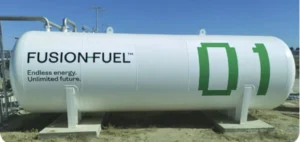Cepsa partners with the Port of Rotterdam for the first hydrogen supply corridor between southern and northern Europe. The representatives of the ports of Rotterdam and Algeciras ratify a memorandum of understanding (MoU) specifying the terms of this contract.
A strategic corridor
Cepsa and the Port of Rotterdam aim to supply Northern Europe. The two partners hope to export about 4.6 million tons of low-carbon hydrogen by 2030. A supply of this magnitude would result in a reduction of 46 million tons of C02 emissions. The corridor between the port of Rotterdam and the port of Algeciras in Spain will be the first hydrogen supply project in Europe.
Cepsa plans to export the hydrogen produced at the San Roque Energy Park near the Bay of Algeciras. The transfer will be done via clean hydrogen carriers such as ammonia or methanol, to the port of Rotterdam. Rotterdam is home to one of Europe’s most important ports, through which 13% of European energy consumption passes.
Algeciras is the first port in Spain, the fourth in Europe and an important trade route between Europe and Asia. The project is supported by the Dutch government and is part of Rotterdam’s energy transition plans. Hydrogen pipelines will connect large industrial areas in the Netherlands, Belgium and Germany.
Decarbonizing maritime transport
The supply of biofuels will decarbonize the industry and shipping in the Bay of Algeciras and Rotterdam. This project is also in line with the strategy of the European Union’s REpowerEU program. This corridor is indeed a way to guarantee Europe’s energy independence and stimulate the production of green energy.
The director of the Port of Rotterdam Authority, Allard Castelein, says:
“Northern Europe uses too much energy to be produced in an environmentally sustainable way. We therefore need to increase the trade routes for clean hydrogen with exporting countries and private companies worldwide. We expect nearly 20 Mton of hydrogen to flow from the Port of Rotterdam by 2050.”
Cepsa plans to become a major player in the production of clean hydrogen in Europe and more specifically a leader in Spain and Portugal. The company will continue to seek partnerships to accelerate the development of renewable hydrogen and other biofuels on the continent.
Cepsa hopes to have a capacity of 2GW by 2030, as part of its Positive Motion strategy. The company will have to develop a portfolio of 7GW of renewable energy, driven by solar and wind projects in collaboration with local stakeholders. In addition, an additional supply network will be set up in the Ràbida Energy Park in Huelva.






















